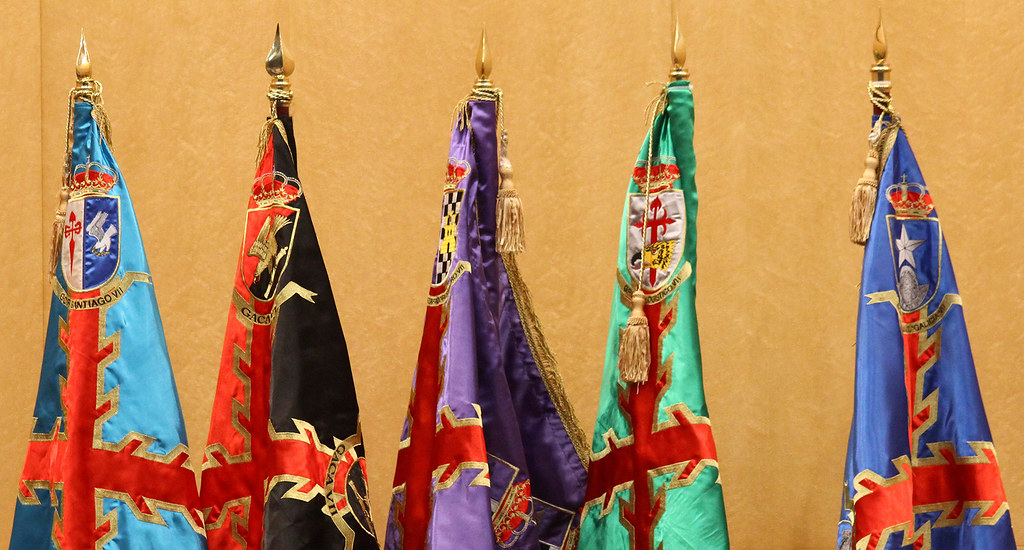The meaning of the colors of the guidons and flags of the Spanish Army
If there is something that distinguishes the Spanish military flags from those used in other countries, it is because of their color and their ornamental richness.
The use of the Cross of Burgundy in the flags of the Spanish Army
A common element, which has been rightly recovered during the current Monarchy, is the use of the Cross of Burgundy -with different colors, but mostly red- in the scripts and pennants used by different units of the Spanish Army. We have already seen here the historical origin of this symbol, but many may be wondering what the different colors that are used in combination with that cross respond to.

The custom of using the Cross of Burgundy on different backgrounds is not current. It already occurred in the time of the Tercios Viejos, when the emblem of the Hispanic Monarchy was generally combined with designs and ornaments that They usually represented the field maestre, which was the position held by the person in charge of each Tercio. Obviously, this custom was lost, since today the emblems of each military unit are not linked in this way to their commanders. So, what do those colors respond to?

Each Arm and Corps of the Spanish Army has distinctive colors
The explanation is very simple: for many years, each Arm or Corps of the Spanish Army has a distinctive color. This is not exclusive to Spain, as other armies -such as the German or the Polish- also have this custom. It is not easy to find an official document that indicates the corresponding colors in the Spanish case. In the legislation of the Army I have not found anything regard. The most I have found is a list of the distinctive colors of the units of the Royal Guard, which coincide with the uses of the Army.

The distinctive colors established in November 1936
As for the origin of these distinctive colors, the furthest I have found appears in the BOE edited in Burgos on November 5, 1936, which published an order issued on November 2 by General Germán Gil y Yuste, a member of the Defense Board of the national side, in which the colors that would be worn in the "cookies" where the badges and emblems are placed were indicated:
"Distinctive colors of the various Arms and Corps:
Staff.—Blue.
Infantry (Regiments).-Red
Idem (Mountain Battalions).-Green.
Cavalry.—Azure blue.
Artillery.—Red and black (upper half black, lower half red).
Engineers.—Garnet.
Legal Corps.—Purple.
Quartermaster.—Blue tub.
Military Health.—Yellow".

A curious detail is represented by the colors of the Artillery Weapon, red and black. Regardless of the epic interpretations that can be given to them, the colors clearly evoke two common elements of their trade: fire and gunpowder. The fact is that those colors were also used on the Republican side, but the other way around (the upper half red) by the anarchists. Today, in the Army there are various combinations of both colors, the most common being the one that places red at the top.

Distinctive colors currently used in scripts
The current distinctive colors of the Arms and Corps of the Army do not coincide with those established in the aforementioned order of November 1936. Right from the start, the purple color that was traditional for the colonel flags of engineers has been recovered. From the data I have managed to gather, the current colors are as follows:
Red: Infantry.
Red and black: Artillery.
Light blue: Cavalry.
Medium blue: General Staff and FAMET.
Medium green: Mountain Troops and Special Operations.
Light green: Logistics.
Purple: Engineers.
Purple and white: Transmissions and Electronic Warfare.
Purple and blue: Information Systems, Telecommunications and Technical Assistance.
Brown: Military Police.
Yellow: Health.
Black and white: Intelligence and Information Operations.

There are exceptions to the use of these colors. For example, Legion and Parachute Brigade (BRIPAC) units use different colored flags. Likewise, the guidon of the Brigade "Galicia" VII (BRILAT) is blue, which does not correspond to its original condition as an infantry unit. On the other hand, company pennants, smaller than the brigade and regiment scripts, are blue, red, yellow and green (if I'm not mistaken) depending on the corresponding number of the company. In this case there are also exceptions, such as the colorful pennants of BRIPAC companies.

|
Don't miss the news and content that interest you. Receive the free daily newsletter in your email: |
- Most read
- The 'hole' without civil flights around Paris during the opening of the Olympic Games
- Stunning footage of the F-15QA Ababil in flight recorded from its cockpit
- The firearms used by the Pontifical Swiss Guard, the smallest army in the world
- The most distant deployment of the Spanish Air Force in Australia and New Zealand
- Eurofighter vs F-35: the opinions of professional pilots on these advanced fighters
- The first photo of an F-16 fighter with Ukrainian insignia and the details it has revealed
- This is the driver station of an M1 Abrams tank and the impressive start of its engine

 ES
ES







Opina sobre esta entrada: